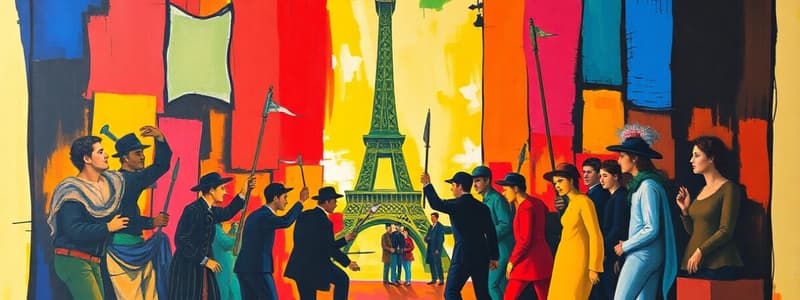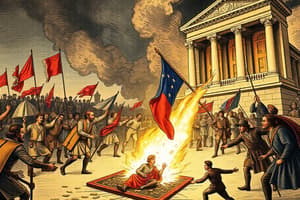Podcast
Questions and Answers
What role did Louis XVI's indecisiveness play in the outcome of the French Revolution?
What role did Louis XVI's indecisiveness play in the outcome of the French Revolution?
Louis XVI's indecisiveness contributed to the escalation of the crisis, undermining public trust and leading to the revolution's success.
In what ways did Marie Antoinette's lifestyle contribute to public resentment during the French Revolution?
In what ways did Marie Antoinette's lifestyle contribute to public resentment during the French Revolution?
Marie Antoinette's extravagant lifestyle and perceived indifference exacerbated the suffering of common people, fueling their discontent.
Describe Maximilien Robespierre's role during the Reign of Terror.
Describe Maximilien Robespierre's role during the Reign of Terror.
Robespierre led the Committee of Public Safety, guiding the Reign of Terror and establishing a dictatorial regime characterized by radical measures.
How did Napoleon Bonaparte's rise to power signify a shift in the revolutionary ideals of France?
How did Napoleon Bonaparte's rise to power signify a shift in the revolutionary ideals of France?
What lasting impact did the French Revolution have on global political thought?
What lasting impact did the French Revolution have on global political thought?
How did the abolition of feudalism during the French Revolution contribute to societal change?
How did the abolition of feudalism during the French Revolution contribute to societal change?
What were some key social and political reforms initiated during the French Revolution?
What were some key social and political reforms initiated during the French Revolution?
Discuss the implications of the Reign of Terror on the preservation of revolutionary ideals.
Discuss the implications of the Reign of Terror on the preservation of revolutionary ideals.
Analyze how the French Revolution's end of monarchy reshaped France's political landscape.
Analyze how the French Revolution's end of monarchy reshaped France's political landscape.
What lessons can be learned from the interplay between revolutionary ideals and authority during the French Revolution?
What lessons can be learned from the interplay between revolutionary ideals and authority during the French Revolution?
What social structure characterized France before the revolution, and how did it contribute to discontent?
What social structure characterized France before the revolution, and how did it contribute to discontent?
How did the extravagant spending of the royal family impact public sentiment during the French Revolution?
How did the extravagant spending of the royal family impact public sentiment during the French Revolution?
Identify two economic hardships that contributed to the revolutionary fervor in France.
Identify two economic hardships that contributed to the revolutionary fervor in France.
Which Enlightenment ideals played a significant role in challenging the monarchy during the French Revolution?
Which Enlightenment ideals played a significant role in challenging the monarchy during the French Revolution?
Describe the significance of the storming of the Bastille in the context of the revolution.
Describe the significance of the storming of the Bastille in the context of the revolution.
What was the purpose of the Declaration of the Rights of Man and of the Citizen during the French Revolution?
What was the purpose of the Declaration of the Rights of Man and of the Citizen during the French Revolution?
What characterized the Reign of Terror and who were its principal leaders?
What characterized the Reign of Terror and who were its principal leaders?
How did the rise of Napoleon Bonaparte signify a shift in the French political landscape post-revolution?
How did the rise of Napoleon Bonaparte signify a shift in the French political landscape post-revolution?
What role did weak leadership play in the crises leading up to the French Revolution?
What role did weak leadership play in the crises leading up to the French Revolution?
Discuss the combination of factors that led to the outbreak of the French Revolution.
Discuss the combination of factors that led to the outbreak of the French Revolution.
Flashcards
What caused the French Revolution?
What caused the French Revolution?
The French Revolution wasn't caused by a single event, but a combination of issues that led to widespread anger and social upheaval.
What was the Ancien Régime?
What was the Ancien Régime?
The rigid social structure of France before the Revolution, where the clergy and nobility had special privileges and paid few taxes, while commoners bore the burden.
What was the problem with royal spending?
What was the problem with royal spending?
The excessive spending of the French monarchy, especially Louis XVI and Marie Antoinette, worsened the economic situation and fueled public resentment.
What was the role of economic hardship?
What was the role of economic hardship?
Signup and view all the flashcards
How did the Enlightenment influence the Revolution?
How did the Enlightenment influence the Revolution?
Signup and view all the flashcards
What was the first stage of the Revolution?
What was the first stage of the Revolution?
Signup and view all the flashcards
What happened during the moderate phase?
What happened during the moderate phase?
Signup and view all the flashcards
What was the Reign of Terror?
What was the Reign of Terror?
Signup and view all the flashcards
What happened after the Reign of Terror?
What happened after the Reign of Terror?
Signup and view all the flashcards
Why is the French Revolution significant?
Why is the French Revolution significant?
Signup and view all the flashcards
Louis XVI
Louis XVI
Signup and view all the flashcards
Marie Antoinette
Marie Antoinette
Signup and view all the flashcards
Maximilien Robespierre
Maximilien Robespierre
Signup and view all the flashcards
Napoleon Bonaparte
Napoleon Bonaparte
Signup and view all the flashcards
Impact of the French Revolution
Impact of the French Revolution
Signup and view all the flashcards
Overthrow of the Monarchy
Overthrow of the Monarchy
Signup and view all the flashcards
Ideals of the Revolution
Ideals of the Revolution
Signup and view all the flashcards
Abolition of Feudalism
Abolition of Feudalism
Signup and view all the flashcards
Reforms of the Revolution
Reforms of the Revolution
Signup and view all the flashcards
The Reign of Terror
The Reign of Terror
Signup and view all the flashcards
Study Notes
Causes of the French Revolution
- The French Revolution was a period of radical social and political upheaval in late 18th-century France.
- A deeply unequal social structure, the Ancien Régime, where the clergy and nobility were largely exempt from taxes while the commoners bore the burden, contributed significantly to discontent.
- The extravagant spending of the French monarchy, particularly under Louis XVI and Marie Antoinette, fueled public anger amidst economic hardship.
- Economic difficulties, including poor harvests, rising food prices, and widespread unemployment, worsened social tensions.
- Enlightenment ideals, emphasizing liberty, equality, and popular sovereignty, challenged traditional authority. Philosophers like Montesquieu and Rousseau influenced revolutionary thinking.
- Louis XVI's weak leadership and indecisiveness exacerbated the crisis.
Stages of the French Revolution
- The revolution progressed through distinct stages of increasing radicalism and violence.
- The initial phase involved the storming of the Bastille, symbolizing rebellion against royal authority, and the establishment of the National Assembly.
- A moderate phase saw the drafting of the Declaration of the Rights of Man and of the Citizen, outlining fundamental rights.
- The Reign of Terror, led by Robespierre, was a period of extreme violence and political repression against perceived enemies of the revolution.
- Napoleon Bonaparte's rise to power, following the Reign of Terror, marked the end of the revolutionary era.
Key Figures
- Louis XVI was the French monarch during the revolution. His indecisiveness was a key factor in its outcome.
- Marie Antoinette, Louis XVI's queen, was criticized for her perceived indifference to the common people's suffering.
- Maximilien Robespierre was a leader in the radical phase, guiding the Committee of Public Safety and the Reign of Terror, which led to a dictatorial regime.
- Napoleon Bonaparte seized power after the Reign of Terror, ultimately ending the revolutionary era. He, however, was also an architect of the continuation of some revolutionary ideals.
Impact of the French Revolution
- The French Revolution profoundly impacted France and the wider world.
- It led to the overthrow of the monarchy and the establishment of a republic, reshaping French politics.
- The ideals of liberty, equality, and fraternity heavily influenced subsequent revolutionary movements globally.
- The revolution dismantled feudalism and aristocratic privilege thus fostering a more egalitarian society.
- Significant social and political reforms, especially within the legal system, emerged. The revolution also demonstrated the extreme dangers of unchecked radicalism during the Reign of Terror, and the volatility of revolutionary ideals.
Studying That Suits You
Use AI to generate personalized quizzes and flashcards to suit your learning preferences.




